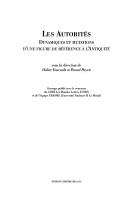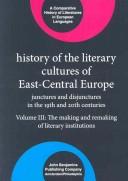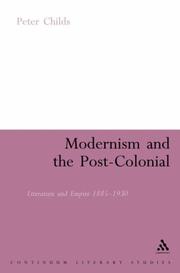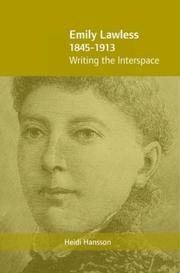| Listing 1 - 5 of 5 |
Sort by
|

ISBN: 9782841372034 Year: 2007 Volume: *6 Publisher: Grenoble Jérôme Millon
Abstract | Keywords | Export | Availability | Bookmark
 Loading...
Loading...Choose an application
- Reference Manager
- EndNote
- RefWorks (Direct export to RefWorks)
Authority --- History --- Literature and history --- History and literature --- History and poetry --- Poetry and history --- Historiography --- Political science --- Authoritarianism --- Consensus (Social sciences) --- Methodology --- Europe --- Historiography.

ISBN: 1282154478 9786612154478 9027292353 9789027292353 9027234558 Year: 2007 Publisher: Amsterdam ; Philadelphia : John Benjamins Pub.,
Abstract | Keywords | Export | Availability | Bookmark
 Loading...
Loading...Choose an application
- Reference Manager
- EndNote
- RefWorks (Direct export to RefWorks)
The third volume in the History of the Literary Cultures of East-Central Europe focuses on the making and remaking of those institutional structures that engender and regulate the creation, distribution, and reception of literature. The focus here is not so much on shared institutions but rather on such region-wide analogous institutional processes as the national awakening, the modernist opening, and the communist regimentation, the canonization of texts, and censorship of literature. These processes, which took place in all of the region's cultures, were often asynchronous and subjected to different local conditions. The volume's premise is that the national awakening and institutionalization of literature were symbiotically interrelated in East-Central Europe. Each national awakening involves a language renewal, an introduction of the vernacular and its literature in schools and universities, the creation of an infrastructure for the publication of books and journals, clashes with censorship, the founding of national academies, libraries, and theaters, a (re)construction of national folklore, and the writing of histories of the vernacular literature. The four parts of this volume are titled: (1) Publishing and Censorship, (2) Theater as a Literary Institution, (3) Forging Primal Pasts: The Uses of Folk Poetry, and (4) Literary Histories: Itineraries of National Self-images.
Literature and history --- East European literature --- History and literature --- History and poetry --- Poetry and history --- History --- History and criticism. --- Europe, Eastern --- History.

ISBN: 1472543130 1283205556 9786613205551 1441135537 9781441135537 9780826485588 0826485588 9781472543134 9781283205559 6613205559 Year: 2007 Publisher: London ; New York : Continuum,
Abstract | Keywords | Export | Availability | Bookmark
 Loading...
Loading...Choose an application
- Reference Manager
- EndNote
- RefWorks (Direct export to RefWorks)
"This book considers the shifts in aesthetic representation over the period 1885-1930 that coincide both with the rise of literary Modernism and imperialism's high point. If it is no coincidence that the rise of the novel accompanied the expansion of empire in the eighteenth-century, then the historical conditions of fiction as the empire waned are equally pertinent. Peter Childs argues that modernist literary writing should be read in terms of its response and relationship to events overseas and that it should be seen as moving towards an emergent post-colonialism instead of struggling with a residual colonial past. Beginning by offering an analysis of the generational and gender conflict that spans art and empire in the period, Childs moves on to examine modernism's expression of a crisis of belief in relation to subjectivity, space, and time. Finally, he investigates the war as a turning point in both colonial relations and aesthetic experimentation. Each of the core chapters focuses on one key writer and discuss a range of others, including: Conrad, Lawrence, Kipling, Eliot, Woolf, Joyce, Conan Doyle and Haggard."--Bloomsbury Publishing.
English fiction --- Modernism (Literature) --- Literature and history --- Imperialism in literature. --- Colonies in literature. --- Postcolonialism in literature. --- History and literature --- History and poetry --- Poetry and history --- History --- Crepuscolarismo --- Literary movements --- History and criticism.
Book
ISSN: 03425991; 03425991 ISBN: 9783769616446 3769616448 Year: 2007 Volume: 2007 (4) Publisher: München Bayerische Akademie der Wissenschaften
Abstract | Keywords | Export | Availability | Bookmark
 Loading...
Loading...Choose an application
- Reference Manager
- EndNote
- RefWorks (Direct export to RefWorks)
Greek literature --- Literature and history --- Transmission of texts --- Anatolian languages --- Trojan War --- History and criticism --- Literature and history. --- Anatolian languages. --- Trojan War. --- History and criticism. --- Mythology, Greek --- History and literature --- History and poetry --- Poetry and history --- History --- Indo-European languages --- Greek literature - History and criticism --- Transmission of texts - Greece

ISBN: 9781859184134 1859184138 Year: 2007 Publisher: Cork: Cork university press,
Abstract | Keywords | Export | Availability | Bookmark
 Loading...
Loading...Choose an application
- Reference Manager
- EndNote
- RefWorks (Direct export to RefWorks)
Women and literature --- Literature and history --- Feminism in literature --- National characteristics, Irish, in literature --- History --- Lawless, Emily, --- Criticism and interpretation --- History and literature --- History and poetry --- Poetry and history --- Feminist theory in literature --- E. L. (Emily Lawless), --- L., E. (Emily Lawless), --- Criticism and interpretation. --- Ireland --- In literature. --- Women and literature - Ireland - History - 19th century --- Literature and history - Ireland - History - 19th century --- Lawless, Emily, - 1845-1913 - Criticism and interpretation --- Lawless, Emily, - 1845-1913
| Listing 1 - 5 of 5 |
Sort by
|

 Search
Search Feedback
Feedback About UniCat
About UniCat  Help
Help News
News